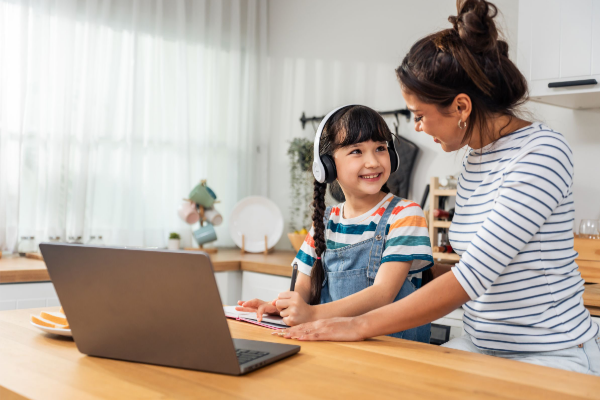5 min read
The Importance of Parent-Teacher Collaboration
By: Lincoln Learning Solutions on Apr 15, 2024 8:00:00 AM

A child’s education is, by its very nature, a collaborative process. It takes the efforts of every member of the institution, as well as the involvement of parental guidance—or that of the main caregiver or legal guardian. This is the basis of comprehensive, traditional on-site learning, and if we learned anything from the COVID-19 pandemic, it’s doubly so for online school. Here are a few benefits that highlight the importance of building a strong partnership between teachers and parents in online school.
The Basics
Long before the pandemic, the parents’ role in their children’s education has always been a crucial element. Setting up a routine for everyday school attendance, helping them with homework, and attending PTA meetings are all essential to boosting a child’s education.
As the Early Childhood Learning & Knowledge Center’s Office of Head Start suggests, a successful partnership between faculty and family is the result of a number of steps that take into account the needs of the child and the skills and strengths of each member of the team. These partnerships become more important when education takes place through a computer screen with a teacher who has to keep an eye on many students. It takes support from the teacher to the parent, the parent to the teacher, and the two parties to the child, who will have the most challenging experience.

Resource Sharing
The first entry is both a suggestion for implementation and one of the great strengths of teacher-parent partnerships. Establishing multiple methods of sharing resources, tangible and intangible, allows the parent and teacher to customize the lessons to the student’s needs more accurately. Exchanging resources helps the instructor understand the student and the parents to assist their child, as we’ll see in the next point.
Enhanced understanding of educational materials
According to a study published by the NIH, strategies of involvement in a child’s lessons can have a positive impact on their learning and performance. The availability of the parent in the home while the child takes their lesson online allows the parent to listen to the instructions and answer any questions that may come up after class.
Further, if the parent and the teacher have strong communication with one another, the parent will be prepared to foresee questions and better evaluate the way their child tackles each assignment. Regardless of the content of the materials, a strong partnership between educator and parent is an excellent way to support the student with the content and flow of the lesson.

Greater Engagement
Building on the understanding of lesson materials, a parent can offer excellent engagement support for their child in and out of class. There is a myriad of examples, including fun math exercises while your child helps you cook, talking about plant nourishment when you water the flowers, and more. Additionally, having the parent present, or at least nearby, lets them spot when their child is quietly disengaging from the lesson, giving them a chance to guide them back.
Technical issues
Infrastructure always varies from building to building, and homes aren’t usually as prepared as educational buildings to support long-form video chatting. The parent can help their child in case of technical difficulties and inform the teacher if the solution will take time. This kind of support alleviates stress from the child, which, as we’ll see, is key to the student’s experience.
Emotional and social support
Learning can be stressful, especially if the student struggles to absorb a lesson. What’s more, navigating the changes of online education, especially after having experienced on-site learning, can be challenging for everyone involved. A strong partnership between parents and teachers can provide a support system for the student. The California Department of Education provides several resources for educators, parents, and students in matters of emotional and social aid.
In addition, one of the greatest forfeits that result from swapping online learning is that of social contact. Interaction with one’s peers is a key element of education. It lets students compare notes and share leisure and play, which is proven to have a positive impact on student performance and provides important lessons on self-management skills and resilience. Working together, teachers and parents can spot and assess the child’s needs and support one another in their aid.
Providing a strong learning environment for our children is a constant effort. By pulling together the strengths of parents and teachers, as well as their unique understanding of the child’s needs, we can offer better solutions to their needs. Online learning is only going to become more ubiquitous and sophisticated. It is our responsibility to adapt to the coming changes, but a strong partnership between everyone involved can give us the tools we need to ensure student success.
The Lincoln Learning Solutions curriculum is designed to assist educators in providing a more comprehensive learning experience that facilitates student success. Our parent-teacher guide for K-5 is an excellent companion for navigating virtual learning in this key stage of development. We also provide training for parents and teachers who seek to empower their students’ education beyond the lessons in the classroom. Explore our curriculum here.
Related Posts
A Parent's Role in Online Education
When it comes to online learning, parents are often unsure of how they can help their children...
Supporting Parents in Online learning
One of the most surprising results brought on by the COVID-19 pandemic was the significant...
Visions In Education + Lincoln Learning: Delivering on the Promise of Personalized Education
One Vision, One Mission
Visions In Education, a tuition-free public charter school serving over...